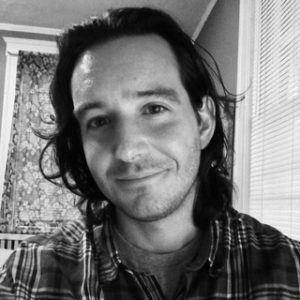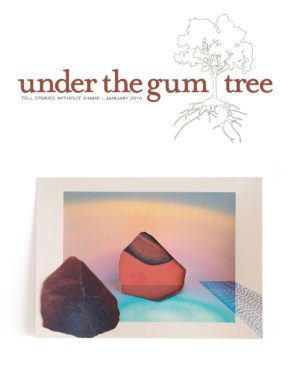Dorian Fox

Dorian Fox’s essays, articles and stories have appeared or are forthcoming in december (as Honorable Mention, 2015 Curt Johnson Prose Awards Nonfiction), Gastronomica, Alimentum, Monkeybicycle, National Parks Magazine, and elsewhere. His work has also been shortlisted for awards by Ploughshares, Phoebe and Bellingham Review. He received his MFA in Creative Nonfiction from Emerson College and teaches writing at Grub Street in Boston.
When did you start writing and why? What inspires your writing now?
I started writing as a kid. My parents read to me a lot, and I think I wanted to emulate those stories: Richard Scarry, Seuss, Sendak. But the nonfiction impulse was there from early on, too. In kindergarten we did a little book project, and mine was an illustrated guide to birds. The teacher typed up our words and spiral-bound the pages and drawings, and I thought that was the coolest thing, turning my ideas into a physical object that I could hold.
These days I write mainly to figure things out. And since I’m drawn to personal writing and memoir, it’s often myself I’m trying to figure out. I tend to write about events and memories that bother me. Something that sticks or hurts or confuses. It’s usually a problem that can’t be easily solved, if at all, but writing can help to see those problems more clearly.
You earned your Master of Fine Arts in Creative Nonfiction from Emerson College. What drew you toward writing nonfiction over fiction?
I like writing fiction, but I’ve often felt my imagination doesn’t run deep enough to be really good at it. The trick of making invented characters feel viscerally real is amazing to me. I applied to Emerson’s nonfiction program because, at the time, I felt more at home grounding my work in my own experience. I guess I still do. I like the imperative of an authentic voice: speaking directly to the reader as yourself (or some version of yourself). And I’ve come to appreciate the unique struggle of being honest about what you’ve done and why. It’s you on the page, so you can’t hide. The reader will know.
In your opinion what criteria does an event have to meet to make a decent subject for a creative nonfiction piece?
Like with any story, conflict is the main thing. It doesn’t have to be a monumental conflict (think: Virginia Woolf’s moth dying on the windowsill), just an interesting one that the writer has a clear emotional or intellectual stake in. A great piece of creative nonfiction can take almost any form, and there are no rules aside from trying to tell the truth. But I think we should feel the writer pushing toward some kind of answer, even if that answer can’t be known.
The Other First” describes what might have been your first kiss—depending on how you define “kiss.” Looking back, do you regret that day in the treehouse?
I do consider it my first kiss, and no, I don’t regret it—but I did for a long time after it happened, even into my twenties. That was why I wanted to write the piece, I think: to fully confront those feelings of shame surrounding what I eventually realized was a normal act of experimentation between boys. At the time, it felt deeply transgressive and abnormal, which is why I lied about it to my friends as a teenager.
It’s embarrassing to admit, but even as I wrote the piece some part of me still worried about what that kiss said about my sexuality and my childhood. It took a few revisions to get the essay to a point where it felt really honest, where I was owning the memory and my feelings about it.
How did that event shape the rest of your adolescence?
In the overall stew of adolescence it was relatively minor, but I think it probably contributed to Nathan and me drifting apart. And I think my feelings about it were symptomatic of a general uneasiness about sex and my body. I was a self-conscious kid, and growing up Catholic in Western Pennsylvania deepened that self-consciousness in certain ways. No adult ever told me kissing a boy was wrong, but this was the 1980s and there was plenty of insinuation. I think I absorbed a fair amount of homophobic stigma from the culture, certainly from other kids, but from adults and media too. Even though I was pretty sure, even then, that I was straight, the treehouse encounter felt like a dark secret, something much heavier than it actually was.
Many coming of age stories examine the theme of lost innocence. Do you feel that this is true of “The Other First” and in what ways?
I do think the piece explores lost innocence, but not the scene in the treehouse, so much. I now see the kiss as an innocent act. It’s what I did years later—lying about it to my friends, betraying Nathan and myself—which really marks the beginning of the end of my childhood. Loss of innocence, to me, is about the ways shame can influence our actions, driving us away from ourselves. Which is the sort of thing that starts to happen around middle school. Lying about Nathan was one example of me doing the wrong thing because I was afraid. I can cite many others from that time in my life.
Is this still an uncomfortable memory for you? What made you decide to finally put this experience into words and show it to others?
It’s not uncomfortable now, but I wonder if it would be if I hadn’t taken the time to write the essay. I think I was drawn to that memory because I sensed, on some level, that it was still unresolved for me.
Still, the prospect of sharing the piece was unsettling at first. More than anything, I worried about writing children in a sexual context, even if the events were true and one of those children was me. I was afraid of offending people. When I expressed my worries in my MFA workshop after submitting the piece, my professor said, “But don’t all children do this?” That really surprised me. So I’d be happy if the essay could be for readers what my professor was for me in that moment: a reminder that sexuality is fluid, and there’s nothing fringe about that. If our culture could get comfortable treating sexuality that way—which, thankfully, is happening more and more—I think we’d all be better off.

